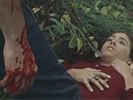Eye For Film >> Movies >> The Last House On The Left (1972) Film Review
The film which finally put the name of Wes Craven on our lips and in our minds, The Last House On The Left is a deliberately cruel and vicious experience. It is also compassionate and transcends its exploitative genre.
Written and directed with considerable dramatic tension, the film begins with every parent's nightmare: the abduction of their children by three escaped psychopathic convicts. Mari (Sandra Cassell) and Phyllis (Lucy Grantham) are on their way to a rock concert when they try to score, not knowing they're about to be drugged and tortured. They survive a night and are driven to the woods for further treatment. Showing resolve and courage, they try to outsmart their captors. Eventually, their parents try to get revenge on the callously brutal psychos, and the final act is interpretable as a powerful exploration of the strength of family and kinship.

The performances are direct, using reasonable actors, and the frighteningly honest portrayals of the young teenagers chill the mind. Resensitising a viewer is a difficult task, given modern audiences' ability to soak up blood and guts, but Craven delivers something far more than a mere bucketload of innards. We will these kids to survive, we want them to live, and convulse in fury at the mutilations and cruelty they suffer.
Skillfully made on a miniscule budget, the film has considerable authenticity due to its cheap and grainy stocks, lots of handheld camerawork, and frightfully direct violence. While it never, ever plays for sympathy for the villains, we are given a carefully controlled window of understanding as to how moments of savage violence occur. We rarely get a moment to rest - nor should we expect one. Ironically, the convicts appear to look upon their prey as their own private toys, and when things inevitably get out of hand they look on them with pained dumbfoundedness.
There is an unforgivable lurch of tone, which given more judicious cutting would leave the film far stronger, retaining the impact which it promises and frequently delivers. Around halfway through the film, during the torture, we are given another story thread to chew on. Two police deputies are played for thinly written laughs as buffoons, and while patrolling the woodland area where the convicts are torturing the girls, their car is put out of action. Perhaps Craven wanted to play up the potential rescue of the girls, but the emphasis is squarely on the stupidity of the characters. It insults the audience.
The Last House On The Left is otherwise a highly accomplished effort from a director who knows how to push an audience's panic buttons, creating both horror and unease.
Reviewed on: 18 Nov 2006




















